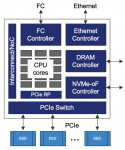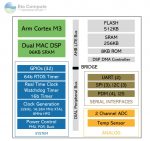If it’s your job to get a SoC design through synthesis, timing/power closure and final verification, the last thing you need are surprises in new versions of the IP blocks that are integrated into the design. If your IP supplier sends a new version, the best possible scenario is that this is only a small incremental change from… Read More
Semiconductor Intellectual Property
Turbo-Charge Your Next PCIe SoC with PLDA Switch IP
SemiWiki has a new IP partner, PLDA and they bring a lot to the party. Peripheral component interconnect express (PCIe) is a popular high-performance data interface standard. Think GPUs, RAID cards, WiFi cards or solid-state disk (SSD) drives connected to a motherboard. The protocol offers much higher throughput than previous… Read More
An Objective Hardware Security Metric in Sight
Security has been a domain blessed with an abundance of methods to improve in various ways, not so much in methods to measure the effectiveness of those improvements. With the best will in the world, absent an agreed security measurement, all those improvement techniques still add up to “trust me, our baby monitor camera is really… Read More
Trends in AI and Safety for Cars
The potential for AI in cars, whether for driver assistance or full autonomy, has been trumpeted everywhere and continues to grow. Within the car we have vision, radar and ultrasonic sensors to detect obstacles in front, behind and to the side of the car. Outside the car, V2x promises to share real-time information between vehicles… Read More
Talking Sense With Moortec – The Future Of Embedded Monitoring Part 2
The rate of product development is facing very real challenges as the pace of silicon technology evolution begins to slow. Today, we are squeezing the most out of transistor physics, which is essentially derived from 60-year-old CMOS technology. To maintain the pace of Moore’s law, it is predicted that in 2030 we will need transistors… Read More
The First SiFive Tech Symposiums of 2020 are Fast Approaching – We’ll be in San José, Costa Rica, and Mexico City This Month
We’re confirming seats for our first two SiFive Tech Symposiums in 2020. The first will take place in San José, Costa Rica on February 25, and the second will be in Mexico City, Mexico, on February 28. Just like our 2019 symposiums, these events are designed to engage the global hardware community in the RISC-V ecosystem, and to further… Read More
The Future Of Embedded Monitoring – February 2020
Shall I compare thee to a…Rolls Royce jet engine?
‘There is a new era dawning whereby deeply embedded sensing within all technology will bring about great benefit for the reliability and performance of semiconductor-based products.’ These were my words during a presentation to an industry audience in China back in September… Read More
TinyML Makes Big Impact in Edge AI Applications
Machine Learning (ML) has become extremely important for many computing applications, especially ones that involve interacting with the physical world. Along with this trend has come the development of many specialized ML processors for cloud and mobile applications. These chips work fine in the cloud or even in cars or phones,… Read More
Using IMUS and SENSOR FUSION to Effectively Navigate Consumer Robotics
There is a live CEVA webinar coming up that you will NOT want to miss. We have been working with CEVA since 2012 and have posted 130 collaborative blogs. Those blogs have earned 927,901 views thus far and counting. The average blog on SemiWiki.com gets 5,885 views so they are ahead of the game.
One of the reasons CEVA is so popular on SemiWiki
A Bundle of Goodies in Bluetooth 5.2, LE Audio
You know that a technology is becoming a trend to watch when the Economist writes a piece on the topic. We know how big an investment goes into monetizing visual content for our phones, pads and TVs, through the likes of Warner Media, Disney and Netflix. Now there’s a big push into monetizing our ears, driven by Apple and others on the… Read More











AI Bubble?